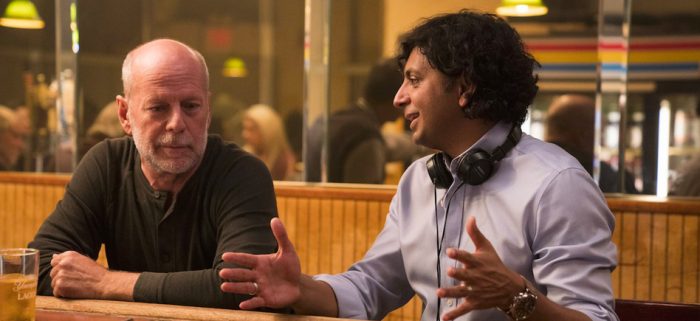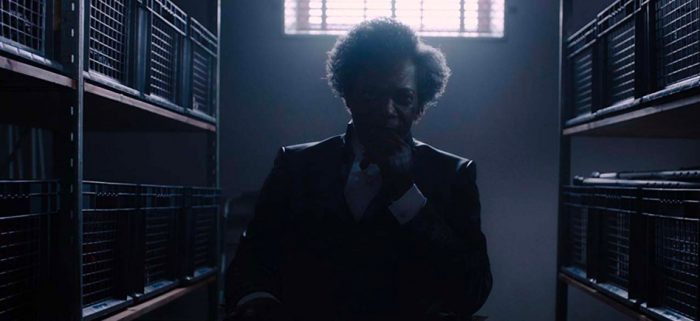M. Night Shyamalan Says He's Had The 'Glass' Ending In Mind Since 2000 – But It's Still The Wrong Choice
Spoilers for Glass follow,obviously.M. Night Shyamalan has completed his superhero trilogy with Glass, now playing in theaters everywhere. The film brings together both Unbreakable and Split for a denouement that left many critics (myself included) rather cold. In my humble opinion, the Glass ending feels like a betrayal of everything I held dear about Unbreakable. But according to Shyamalan himself, he always intended to end his saga this way.
M. Night Shyamalan On the Glass Ending
In true M. Night Shyamalan fashion, the ending of Glass has a whopper of a twist. In the movie, Unbreakable's David Dunn (Bruce Willis) and Elijah Price (Samuel L. Jackson) are locked up in the same mental hospital as Kevin Wendell Crumb (James McAvoy), the antagonist from Split. They're under the care of Dr. Ellie Staple (Sarah Paulson). She's trying to convince all three men that they don't posses special abilities – they're delusional. Of course, we know that's not true. And at the end of the film, it's revealed Dr. Staple does, too. She's part of a secret organization devoted to cover-up any proof of people with special abilities. Basically, a cult that wants to wipe out superheroes. Oh, and then, all three main characters die. But the victory of Dr. Staple and her organization is short-lived, as people close to the three leads – David's son (Spencer Treat Clark), Elijah's mother (Charlayne Woodard), and Kevin's, um, victim (Anya Taylor-Joy) – reveal the truth to the public.
So did this ending come out of left-field (because it sure feels that way), or was this Shyamalan's plan all along, back when he started the trilogy with Unbreakable in 2000? According to the filmmaker, the latter is true. "I always thought it was a little bit of like an opera, even when I was starting on Unbreakable," he told EW. "I thought this was a very operatic end to it all [with] people screaming and all of these kinds of implications. It was about implications more than anything. I'm a big fan of One Flew Over the Cuckoo's Nest as you can probably tell. The format of that movie just blew me away when I saw it. The idea that the journey of the main character gets fulfilled by another character is a very powerful idea."
Does It Work?
No, it does not. Shyamalan has gone on record several times stating that Kevin Wendell Crumb was originally a character in an early draft of Unbreakable, and I have no reason to believe he's lying. But here's the thing: Unbreakable and Split are two very different movies, both in tone and content. And the worlds of these two films should've never been brought together, and Glass is the proof.
I will say this: the faults of Glass aren't so much in Shyamalan's ideas (although some of those ideas are bad). Rather, what kills the film is the execution of those ideas. I don't dislike the concept of a secret organization out to stop superheroes...in theory. But it's too, well, comic book-y. And while Unbreakable hinged on the premise of: "What if comic books weren't entirely fiction?", the way Shyamalan told that story was firmly grounded. Unbreakable is a melancholy, emotional movie with a real heart. And what made it so special was that it felt real. The way Shyamalan created the world of David Dunn and Elijah Price never once rang false – we could believe in what we were seeing, even the fantastical stuff. The moment you start adding in secret cults that stretch back thousands of years – Dr. Staple more or less hints at this during her big speech at the end – you stray too far from what made Unbreakable work so well.
And then you add in the fact that Shyamalan kills off everyone. Look, filmmakers have a right to do whatever they want with their characters. But watching David Dunn be drowned to death was a bridge too far for me. There's a moment at the end of Unbreakable – a moment that Shyamalan even flashes back to – where David and his son Joseph share a knowing glance. It's a silent scene, but it speaks volumes. David is telling his son that he really is a superhero, and Joseph is awed. It's touching, and a perfect send-off to the characters. To then bring them back, and then have Joseph be forced to watch his father murdered before his eyes just feels cruel. It takes the heart and soul of the Unbreakable conclusion and dashes it to bits.
I'm less disappointed by the deaths of Elijah and Kevin. Elijah's death isn't entirely out of left-field – he's a villain, after all, and Jackson has a few moments to shine in his death scene. As for Kevin, well...I don't really care about him. James McAvoy's performance is strong, but I have no emotional attachment to Kevin. To make things weirder, Shyamalan adds a narrative to Glass wherein Casey Cook, one of Kevin's victims, becomes his protector and friend. It really doesn't work, at all. And it's a bit icky, to boot. I know Kevin isn't entirely in control of his actions, but he still murders and eats girls. He still kidnapped Casey and terrorized her. Sure, he let her go at the end of Split, but is that really enough to warrant Casey becoming Kevin's number one fan? Absolutely not. Which makes Kevin's death, where he's cradled by a crying Casey, preposterous.
All of these elements combine to form one of the most disappointing movies I've ever seen. If this really was the ending Shyamalan had in mind when he made Unbreakable, he's a bit of a jerk.

